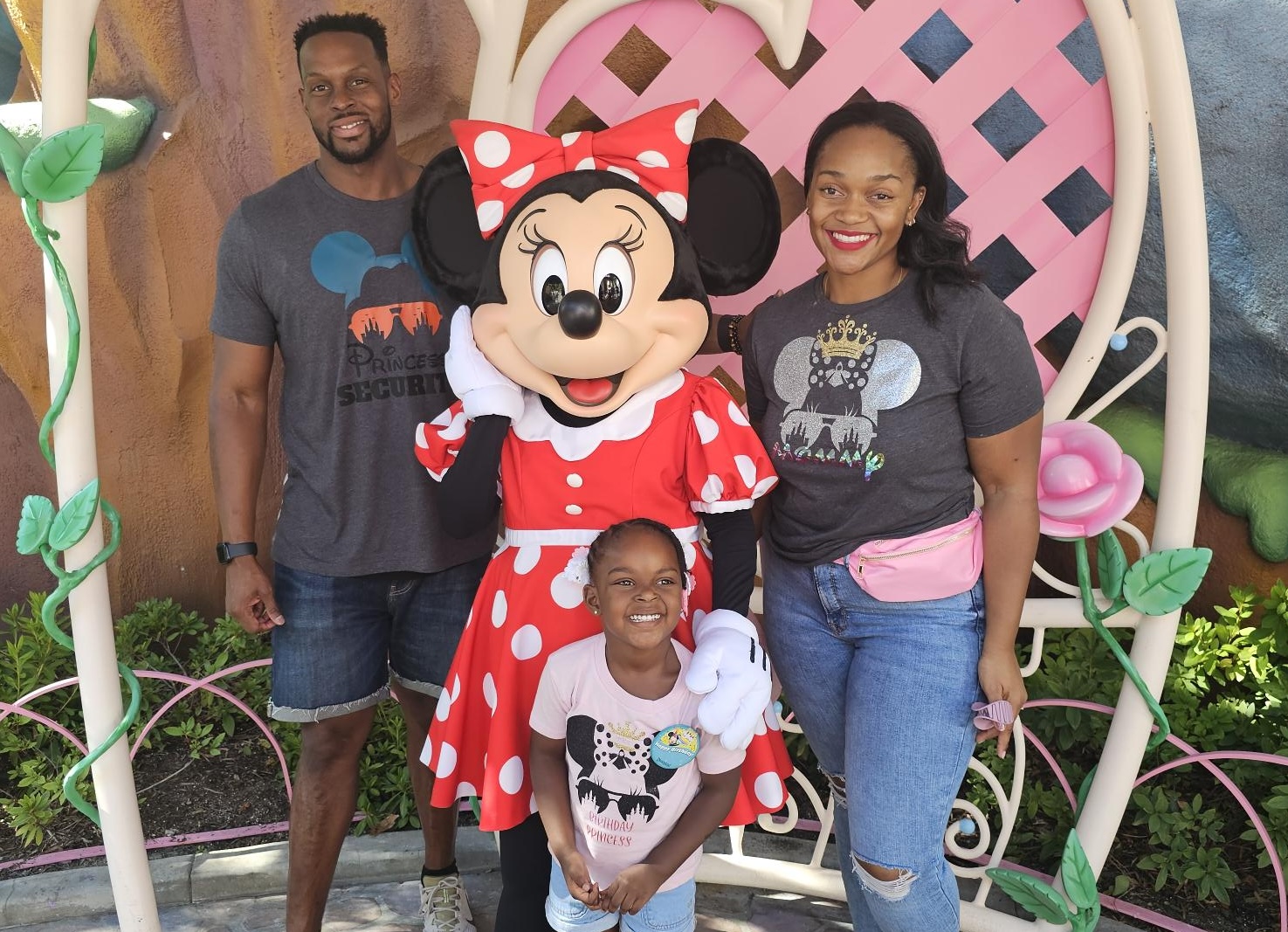Can you tell us a bit about yourself?
My name is LaKendra Cornelius, and I am a first-generation student in my third and final year of the Nurse-Midwifery program at UCSF. I began this journey as part of the MEPN (Master’s Entry Program in Nursing) program. The Nurse-Midwifery program is one of the few MSN programs at UCSF that requires core courses be completed in person. Now, in my final quarter, I’m in the “residency” phase, where I spend my time entirely in the clinical setting, with no didactic in-person requirements. For my intrapartum (L&D) clinicals, I am placed at Kaiser Vacaville, and for antepartum and gynecology clinicals, I am at Sutter Berkeley.
What are your caregiving responsibilities? Who is under your care?
My husband, Waylon, and I are the parents of a five-year-old angel named Amara. Waylon works full time, and all of his family is on the east coast. We've relied on my mom a lot to help navigate the gaps in our schedules while caring for Amara. My academic/clinical schedule has been very inflexible so If my mom is ever unavailable, we either fly Waylon's family out to help or he ends up working from home.

Can you explain how you use the Back-Up Care Program? When do you use the program?
Back-up care has been absolutely essential to my success at UCSF, especially since nearly all of my academic journey here has required my in-person presence. When I began my first year, my daughter was just two years old. During that time, my mom served as her primary caregiver while my husband and I managed the demands of school and work. As Amara grew older, she transitioned to a Montessori school. We quickly learned that having a young school-aged child presented with very unique challenges. School days are shortened to suit their limited attention spans and ease their transition into structured learning, which, while wonderful for Amara's development, made balancing our demanding schedules even more difficult.
Adding to the complexity, my husband Waylon and I commute over an hour each way for school and work. The combination of early dismissals, unexpected no-school days, and long commutes made finding reliable childcare a constant worry. Hints why the back-up care benefit quickly became invaluable for our family.
I relied on back-up care not just for scheduled school closures, but also for the unexpected days when my husband, my mom, or I couldn’t cover Amara’s shortened school days. Our experience with back-up care was so positive that we enrolled Amara at the Bright Horizons center that we used for back-up care. We started her at three days a week.
Still, even with a regular schedule in place, I found myself struggling. I had hoped her off days would be opportunities for us to bond, but the reality was that when I had exams or major assignments approaching, I was often physically present but mentally somewhere else. Mom guilt for the win.
Eventually, I began using back-up care on some of her off days too, when I needed uninterrupted time to study or complete work. For Amara, it meant more time with friends learning and playing in a safe, nurturing environment; for me, it was a chance to focus guilt-free, knowing she was happy and well cared for. As I wrap up my final quarter at UCSF, I’m deeply grateful that my husband’s job also provides back-up care. Knowing that we’ll continue to have access to such an incredible resource brings me a tremendous sense of relief and security for our family’s future.

Would you recommend that other students take advantage of it? What tips do you have to get started?
I 100% recommend that other students take advantage of this benefit, In fact, I believe in this benefit so much that those that opt to not use it should be able to transfer their unused days to other students.
For me, the scariest part of using back-up care was the unknown — not having toured the center beforehand and not being able to personally ensure that the people caring for my child were safe and nurturing. I also worried deeply about Amara feeling “othered” or out of place because she was just a visitor. I imagine this is a fear many parents experience when they find themselves needing childcare unexpectedly.
Because of those worries, I prepared ahead of time. I booked her care in advance to optimize the likelihood of her being accepted at our center of choice. I also visited the center, took my time exploring the space, and spoke with some staff before her scheduled day. Even with all that preparation, I was still blown away by our first experience.
When we arrived, every staff member we encountered already knew who Amara was — they greeted her warmly, addressing her by name the moment she walked through the door. She had her own cubby, labeled just for her, and she was introduced to her classroom in such a welcoming, thoughtful way that it instantly eased my heart. Midway through the day, I even received a phone call just to check in and let me know how she was doing — an unexpected gesture that meant the world to me. At the end of the day, I was given a detailed report, complete with pictures, showing all that she had experienced and learned.
That first experience was everything I had hoped for and more — and it’s why we so quickly decided to enroll her full-time at the center. It wasn’t just back-up care anymore; it was a place where she felt safe, seen, and celebrated.
For parents like me who fear the unknown, I want you to know that your worries have been anticipated and thoughtfully addressed. There are so many care options available to fit your family's unique needs. You can choose from home-based childcare centers, accredited center-based care, or even individual care in your own home — with some options available 24/7. Whatever your situation, there’s truly something designed to offer the support and peace of mind you need.
Please share anything else that you think other UCSF students would find helpful.
I encourage all students to take a moment to explore the back-up care website and see the full range of services this incredible benefit offers. It's not just for childcare — respite care is also available for those caring for older family members.
The hardest part is simply taking that first step and giving it a try. Whether you have children, elderly relatives, or any other dependents, this resource can make an enormous difference. Even if you don't have dependents, there are tutoring services available that you can use for yourself. I truly believe there’s something there to support everyone — you just have to take the time to explore it.